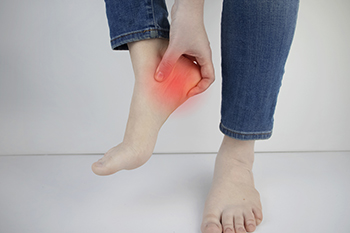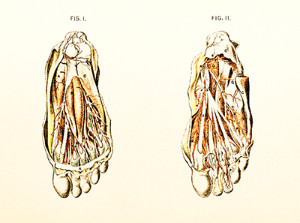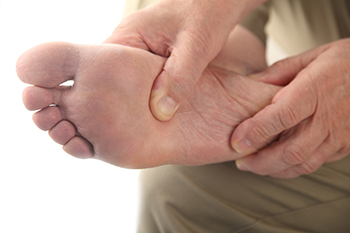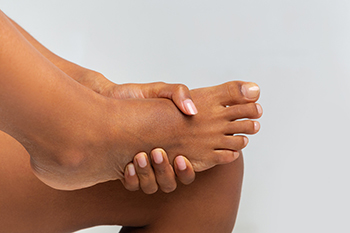Connect With Us
Blog
Items filtered by date: January 2023
When Should Your Baby Be Walking?

It’s hard to pinpoint exactly when a baby should be walking because they develop at different times. Many babies begin walking as early at 8 or 9 months, while others who are so-called late-bloomers may not begin until 16 months. Generally speaking, about half of babies have begun to take steps around 1 year old. The three factors that go into the process include muscle strength, balance, and temperament. The latter is the factor that most affects the age at which your baby will walk, experts say. Some babies continue to crawl because they can move faster than if they try to stand and walk. Early walkers can be more driven to try new motor skills, and lean babies often begin to walk earlier. Most babies simply decide for themselves when they are ready to walk, studies show. If you notice that your baby has certain foot gait abnormalities, such as pigeon-toed, walking on tiptoe, or duck walking, it is a good idea to see a podiatrist for an examination and discussion on possible treatment.
Making sure that your children maintain good foot health is very important as they grow. If you have any questions, contact Dr. Richard Silverstein of Union Foot Care. Our doctor can provide the care you need to keep you pain-free and on your feet.
Keeping Children's Feet Healthy
Having healthy feet during childhood can help prevent medical problems later in life, namely in the back and legs. As children grow, their feet require different types of care. Here are some things to consider...
Although babies do not walk yet, it is still very important to take care of their feet.
Avoid putting tight shoes or socks on his or her feet.
Allow the baby to stretch and kick his or her feet to feel comfortable.
As a toddler, kids are now on the move and begin to develop differently. At this age, toddlers are getting a feel for walking, so don’t be alarmed if your toddler is unsteady or ‘walks funny’.
As your child gets older, it is important to teach them how to take care of their feet.
Show them proper hygiene to prevent infections such as fungus.
Be watchful for any pain or injury.
Have all injuries checked by a doctor as soon as possible.
Comfortable, protective shoes should always be worn, especially at play.
If you have any questions please feel free to contact our office located in Havre de Grace, MD . We offer the newest diagnostic and treatment technologies for all your foot and ankle needs.
What Causes Plantar Fasciitis?

There is a portion of tissue on the bottom of the foot that is called the plantar fascia. It connects the heel to the toes and is instrumental in helping the foot flex while walking, running, and completing other daily activities. An injury may cause the plantar fascia to tear, possibly resulting in plantar fasciitis. It may also occur from overuse that can happen from running or standing on uneven surfaces. Plantar fasciitis is an inflammation that can cause severe pain and discomfort, and may affect the Achilles tendon in the calf. It may also be caused by wearing shoes that do not fit correctly, having an abnormal foot structure, or from weight that has been gained. Common symptoms may include foot pain after sitting or standing for a long period of time, and difficulty in climbing the steps. Additionally, the pain may be more severe after arising in the morning, as the first few steps are taken. If you have foot pain, it is strongly urged that you are under the care of a podiatrist who can accurately diagnose plantar fasciitis, and guide you toward the correct treatment techniques.
Plantar fasciitis can be very painful and inconvenient. If you are experiencing heel pain or symptoms of plantar fasciitis, contact Dr. Richard Silverstein from Union Foot Care. Our doctor can provide the care you need to keep you pain-free and on your feet.
What Is Plantar Fasciitis?
Plantar fasciitis is the inflammation of the thick band of tissue that runs along the bottom of your foot, known as the plantar fascia, and causes mild to severe heel pain.
What Causes Plantar Fasciitis?
- Excessive running
- Non-supportive shoes
- Overpronation
- Repeated stretching and tearing of the plantar fascia
How Can It Be Treated?
- Conservative measures – anti-inflammatories, ice packs, stretching exercises, physical therapy, orthotic devices
- Shockwave therapy – sound waves are sent to the affected area to facilitate healing and are usually used for chronic cases of plantar fasciitis
- Surgery – usually only used as a last resort when all else fails. The plantar fascia can be surgically detached from the heel
While very treatable, plantar fasciitis is definitely not something that should be ignored. Especially in severe cases, speaking to your doctor right away is highly recommended to avoid complications and severe heel pain. Your podiatrist can work with you to provide the appropriate treatment options tailored to your condition.
If you have any questions please feel free to contact our office located in Havre de Grace, MD . We offer the newest diagnostic and treatment technologies for all your foot and ankle needs.
Veins and Spider Veins in the Feet

The feet are complex parts of the human body that are made up of a series of different bones, muscles, tendons, and ligaments. Importantly, the feet also contain veins, which are blood vessels that return old blood to the heart. Sometimes, a condition known as spider veins may develop in the feet. Spider veins essentially develop when many different small veins gather together beneath the skin. As a result, the veins can be visible on the surface of the skin, and they might be red, blue, or purple in color. Luckily, spider veins are mostly harmless to those that develop them. In addition to the feet, spider veins can also develop on the lower legs . If you are someone that wants to learn more about the veins of the feet and particularly how spider veins develop, contact a podiatrist today.
If you have any concerns about your feet, contact Dr. Richard Silverstein from Union Foot Care. Our doctor can provide the care you need to keep you pain-free and on your feet.
Biomechanics in Podiatry
Podiatric biomechanics is a particular sector of specialty podiatry with licensed practitioners who are trained to diagnose and treat conditions affecting the foot, ankle and lower leg. Biomechanics deals with the forces that act against the body, causing an interference with the biological structures. It focuses on the movement of the ankle, the foot and the forces that interact with them.
A History of Biomechanics
- Biomechanics dates back to the BC era in Egypt where evidence of professional foot care has been recorded.
- In 1974, biomechanics gained a higher profile from the studies of Merton Root, who claimed that by changing or controlling the forces between the ankle and the foot, corrections or conditions could be implemented to gain strength and coordination in the area.
Modern technological improvements are based on past theories and therapeutic processes that provide a better understanding of podiatric concepts for biomechanics. Computers can provide accurate information about the forces and patterns of the feet and lower legs.
Understanding biomechanics of the feet can help improve and eliminate pain, stopping further stress to the foot.
If you have any questions please feel free to contact our office located in Havre de Grace, MD . We offer the newest diagnostic and treatment technologies for all your foot and ankle needs.
Reminder: When Was the Last Time...?
Healing Diabetic Foot Ulcers

Diabetic foot ulcers are difficult wounds to heal. The size of the ulcer, gender, and potential infection have been linked to healing time. Larger ulcers and infections tend to lead to longer wound closure times, and men tend to have slower healing time for wounds. One way to have a positive effect on wound healing is by making sure glucose levels are within normal range. It is particularly important for diabetics to examine their feet daily to check for cuts and scrapes that can lead to ulcers. If you have diabetes, it is suggested that you include a podiatrist on your health care team and get your feet checked regularly.
Diabetic foot care is important in preventing foot ailments such as ulcers. If you are suffering from diabetes or have any other concerns about your feet, contact Dr. Richard Silverstein from Union Foot Care. Our doctor can provide the care you need to keep you pain-free and on your feet.
Diabetic Foot Care
Diabetes affects millions of people every year. The condition can damage blood vessels in many parts of the body, especially the feet. Because of this, taking care of your feet is essential if you have diabetes, and having a podiatrist help monitor your foot health is highly recommended.
The Importance of Caring for Your Feet
- Routinely inspect your feet for bruises or sores.
- Wear socks that fit your feet comfortably.
- Wear comfortable shoes that provide adequate support.
Patients with diabetes should have their doctor monitor their blood levels, as blood sugar levels play such a huge role in diabetic care. Monitoring these levels on a regular basis is highly advised.
It is always best to inform your healthcare professional of any concerns you may have regarding your feet, especially for diabetic patients. Early treatment and routine foot examinations are keys to maintaining proper health, especially because severe complications can arise if proper treatment is not applied.
If you have any questions please feel free to contact our office located in Havre de Grace, MD . We offer the newest diagnostic and treatment technologies for all your foot and ankle needs.
Foot Pain From Different Sources

Sometimes, it is possible that parts of the human body can cause us pain. The feet are certainly no exception. This is why you can visit a podiatrist if you are experiencing foot pain. This foot specialist will be able to address the problems that you have been having with your feet and work to find a solution to the problem. Your foot pain can be the result of any number of different foot afflictions. For example, you might be experiencing foot pain from a condition known as plantar fasciitis. This foot condition develops when the plantar fascia, the band of tissue in the arch of the foot, becomes inflamed and irritated. Conversely, you might be experiencing foot pain as a result of a condition known as flat feet. Although many cases of flat feet do not produce pain, it is still possible to feel discomfort from this condition. Flat feet is present in an individual if the entire sole of their foot rests flush against the floor. If you are experiencing foot pain of any kind, err on the side of caution and contact a podiatrist today.
Foot Pain
Foot pain can be extremely painful and debilitating. If you have a foot pain, consult with Dr. Richard Silverstein from Union Foot Care. Our doctor will assess your condition and provide you with quality foot and ankle treatment.
Causes
Foot pain is a very broad condition that could be caused by one or more ailments. The most common include:
- Bunions
- Hammertoes
- Plantar Fasciitis
- Bone Spurs
- Corns
- Tarsal Tunnel Syndrome
- Ingrown Toenails
- Arthritis (such as Gout, Rheumatoid, and Osteoarthritis)
- Flat Feet
- Injury (from stress fractures, broken toe, foot, ankle, Achilles tendon ruptures, and sprains)
- And more
Diagnosis
To figure out the cause of foot pain, podiatrists utilize several different methods. This can range from simple visual inspections and sensation tests to X-rays and MRI scans. Prior medical history, family medical history, and any recent physical traumatic events will all be taken into consideration for a proper diagnosis.
Treatment
Treatment depends upon the cause of the foot pain. Whether it is resting, staying off the foot, or having surgery; podiatrists have a number of treatment options available for foot pain.
If you have any questions, please feel free to contact our office located in Havre de Grace, MD . We offer the newest diagnostic and treatment technologies for all your foot care needs.
Blog Archives
- March 2025
- February 2025
- January 2025
- December 2024
- November 2024
- October 2024
- September 2024
- August 2024
- July 2024
- June 2024
- May 2024
- April 2024
- March 2024
- February 2024
- January 2024
- December 2023
- November 2023
- October 2023
- September 2023
- August 2023
- July 2023
- June 2023
- May 2023
- April 2023
- March 2023
- February 2023
- January 2023
- December 2022
- November 2022
- October 2022
- September 2022
- August 2022
- July 2022
- June 2022
- May 2022
- April 2022
- March 2022
- February 2022
- January 2022
- December 2021
- November 2021
- October 2021
- September 2021
- August 2021
- July 2021
- June 2021
- May 2021
- April 2021
- March 2021
- February 2021
- January 2021
- December 2020
- November 2020
- October 2020
- September 2020
- August 2020
- July 2020
- June 2020
- May 2020
- April 2020
- March 2020
- February 2020
- January 2020
- December 2019
- November 2019
- October 2019
- September 2019
- August 2019
- July 2019
- June 2019
- May 2019
- April 2019
- March 2019
- February 2019
- January 2019
- December 2018
- November 2018
- October 2018
- September 2018
- August 2018
- July 2018
- June 2018
- May 2018
- April 2018
- March 2018
- February 2018
- January 2018
- December 2017
- November 2017
- October 2017
- September 2017
- August 2017
- July 2017
- June 2017
- May 2017
- April 2017
- March 2017
- February 2017
- January 2017
- December 2016
- November 2016
- October 2016
- September 2016
- August 2016
- July 2016
- June 2016
- May 2016

